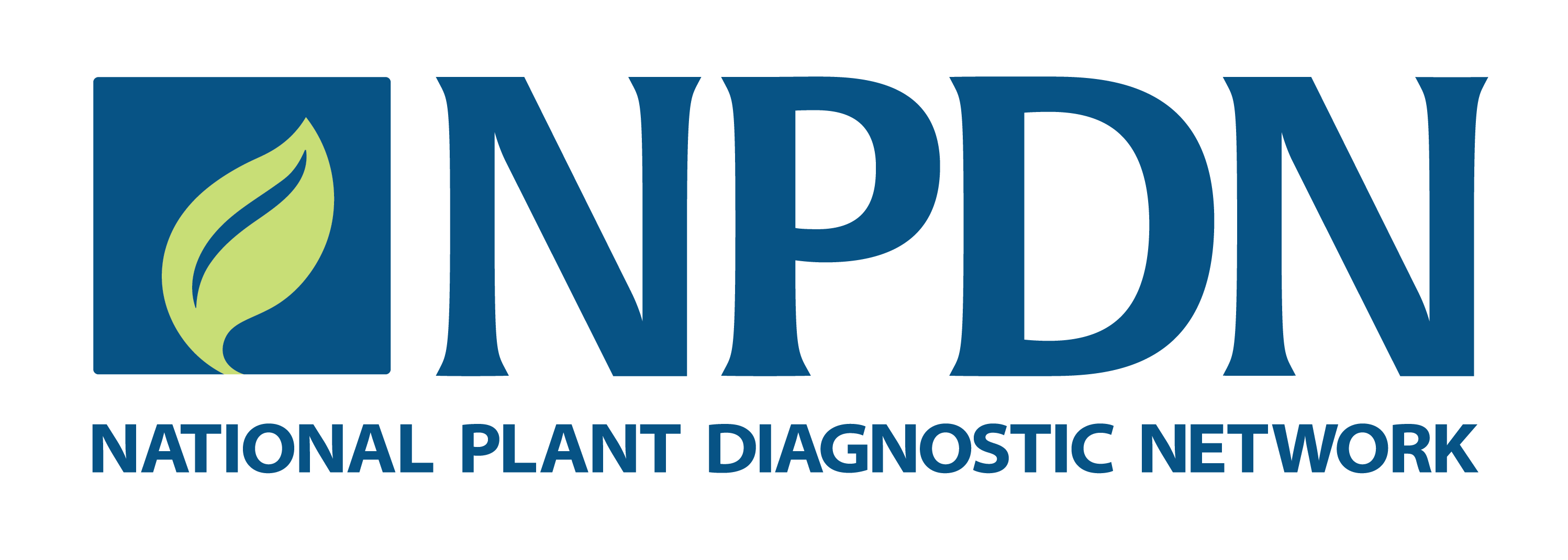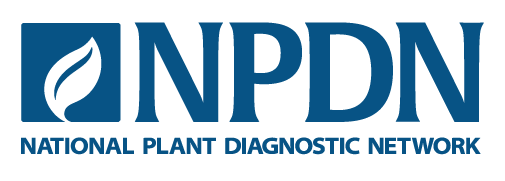Karen Snover-Clift and Barb Riker, Cornell University
Deric Picton and Yazmin Rivera, USDA-APHIS-PPQ-S&T Beltsville Laboratory
Pat Shiel, USDA-APHIS-PPQ-S&T
For 19 years, groups of NPDN members and partners have gathered annually in Maryland for one of our most valued training opportunities, the NPDN-Beltsville Advanced Diagnostic Workshops. Just like so many other aspects of our lives in 2020 and 2021, these workshops also needed to adapt due to the COVID-19 pandemic and associated restrictions. To offer these workshops in 2021, we needed an alternate plan.
You may remember in March of last year, half of the 2020 workshops were suddenly cancelled when the COVID-19 outbreak was declared a pandemic and states began implementing shut-down protocols. We had hoped to make up these sessions in the fall, but as domestic travel restrictions were extended, it became obvious that we needed to focus on how we would provide the 2021 workshops.
To tackle the task of providing workshop materials during a pandemic, a planning team was established in the fall of 2020. The team included Deric Picton and Yazmin Rivera of the USDA-APHIS-PPQ-S&T Beltsville Laboratory, Pat Shiel of USDA-APHIS-PPQ-S&T in Raleigh, and Karen Snover-Clift and Barb Riker of Cornell University.
The planning team members wrestled with how to modify the workshops to meet the pandemic guidelines: Should we offer smaller class sizes with increased distancing between participants? Or live virtual topic lectures? Or prerecorded procedure training videos? After many discussions, the team felt the best option was to convert the workshop materials to a virtual delivery format.
Priority number one was to deliver quality and valuable substitutes for the face-to-face training sessions. As many of you know, there are many benefits to standing in Building 580. When physically in Beltsville, the participants meet the scientists that developed and/or validated the procedures they are using, they tour the facilities, touch and use different pieces of equipment and learn what features are important, perform the hands-on activities in the presence of experts that can guide them as questions arise, focus on the training sessions with no distractions of other responsibilities, and get to spend time networking with their colleagues that perform similar duties and have similar responsibilities to their own.
As we developed the alternate plan, we focused on the advantages of providing an all-virtual workshop season. The primary benefit in 2021 was the increased class size. We were able to triple the allowable number of participants. On-site workshops are capped at eight participants because of travel expenses and the size of the training laboratory. By going virtual, we were able to invite up to 25 participants to each workshop. By not traveling, the participants did not sacrifice time away from their families and from their home-base work responsibilities. Also, recordings of the virtual workshops will be used in future LearnUpon training modules, the NPDN’s new, online, learning management system.
Five subjects were offered virtually in 2021 and delivered between March 9 and April 14. The subjects were selected based on ease of conversion to a virtual format and the annual survey of most requested topics. Two of the workshops included a practical, hands-on activity and materials that needed to be shipped to the participants for processing at their home-base laboratory. Making these substantial changes over a few months was a huge undertaking and took the efforts of many.
March 9, 2021: Seed Extraction Workshop; Lecture only, 2 hours.
March 10-12, 2021: Bioinformatics Workshop-Module SS; Lectures only, 3 days
March 15-17, 2021: Bioinformatics Workshop-Module HTS; Lectures only, 3 days
March 18, 2021: Seed Extraction Workshop; Lecture only, 2 hours.
March 22-30, 2021: Isothermal Amplification Workshop, Lectures March 22 & 30; Independent Lab March 23-26
April 5-13, 2021: Phytophthora 101 Workshop, Lectures April 5 & 13; Independent Lab April 6-9
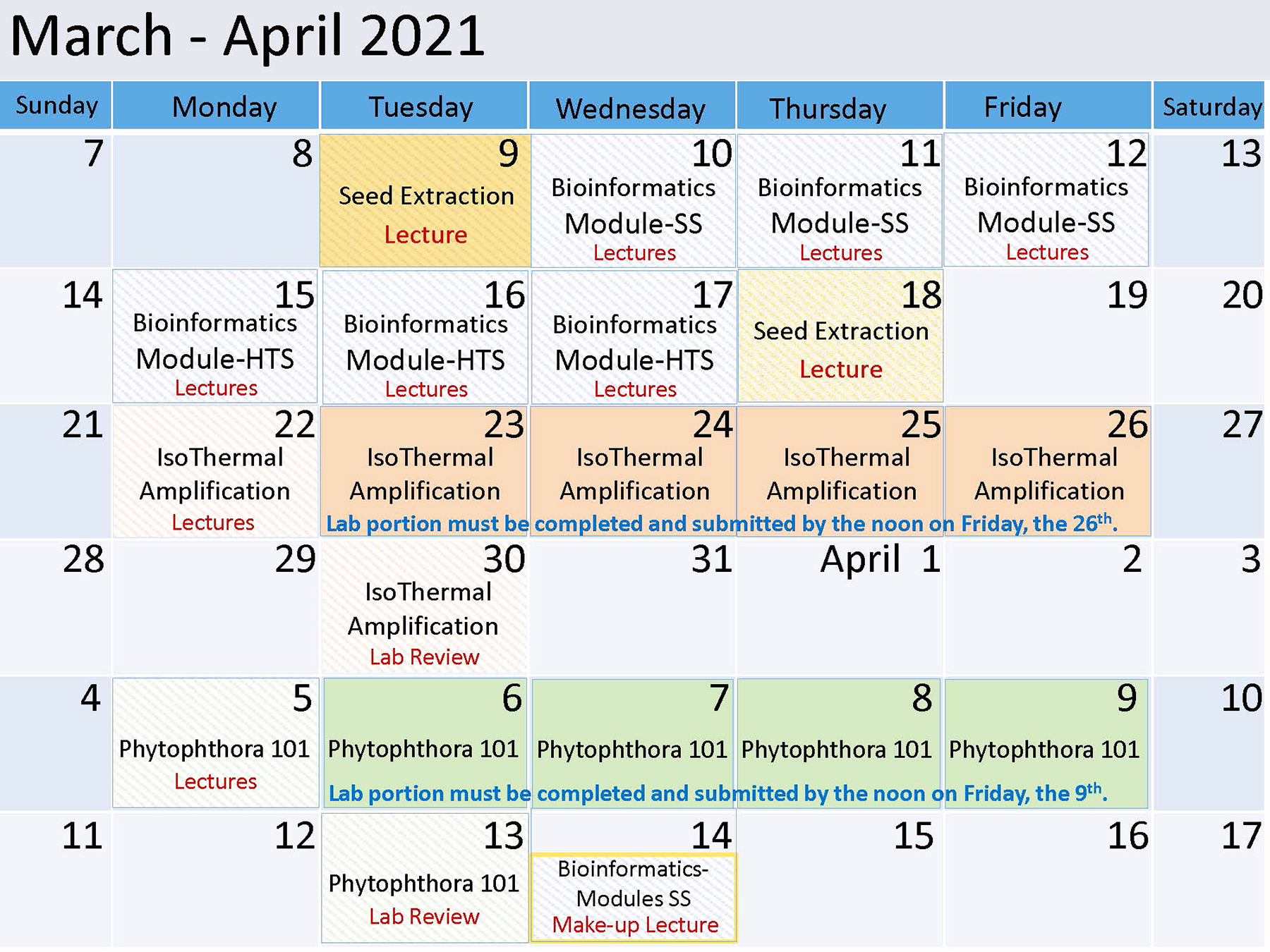
Workshop instructors need to be commended for their ability to quickly modify their lectures into the virtual format without losing the quality of the content. Instructors organized all aspects of the first-time offering of the off-site, hands-on training component. They determined what was needed, prepared materials and instructions, scheduled timely shipments to each participant’s home base, and set aside time to answer questions that arose during the practical exercise. Tripling the number of participants increased the time needed to gather registrants, share plans for each workshop, set up Zoom sessions, deliver preworkshop details and materials, moderate each workshop session, record sessions, and post videos.
The instructors and planning team members want to thank the workshop participants for their patience this year! We learned several lessons during the 4- to 6-hour days on Zoom and through the entire process, and future workshops will benefit from this experience. Even though we feel these workshops were very successful, we all are hoping to travel to Beltsville in March 2022.
Congratulations to all NPDN networks members and partners! We provided valuable training content to 122 participants in six workshops over a six-week period. As you all know, this was done during a time when many professional development opportunities were cancelled due to the pandemic, which makes providing this content even more significant. Past attendees have expressed how beneficial these trainings are for their individual growth, and our leadership is very thankful our members have these network-wide professional development opportunities! We cannot thank the Beltsville Laboratory leadership and scientists enough for their ongoing commitment to delivering the NPDN members and our partners with quality, advanced diagnostic trainings.
Moderators: Deric Picton (USDA-APHIS-PPQ-S&T, Beltsville Laboratory) and Karen Snover-Clift (Cornell University)
Participants: Gaelle Hollandbeck (Kansas Department of Agriculture); Sapp Dickerson (Washington State Department of Agriculture); Allina Bennett, Mackenzie Gunn, Owen Hudson, Tekan Rana, Tammy Stackhouse, Sumyya Waliullah and Emran Ali (University of Georgia); Miranda Harrington (University of Idaho); Phillip Lujan (New Mexico State University); Joy Pierzynski (The Ohio State University); Karen Snover-Clift (Cornell University); Keiddy Urrea-Morawicki, (University of Arkansas); Peng Tian (University of Missouri); Kassie Conner (Auburn University); Michael Melzer, Alejandro Olmedo-Velarde and Alexander Kong (University of Hawaii); Austin Rueda (University of Texas); Ana Cristina Fulladolsa Palma (Colorado State University); Jake Ueckert (Texas A&M University).
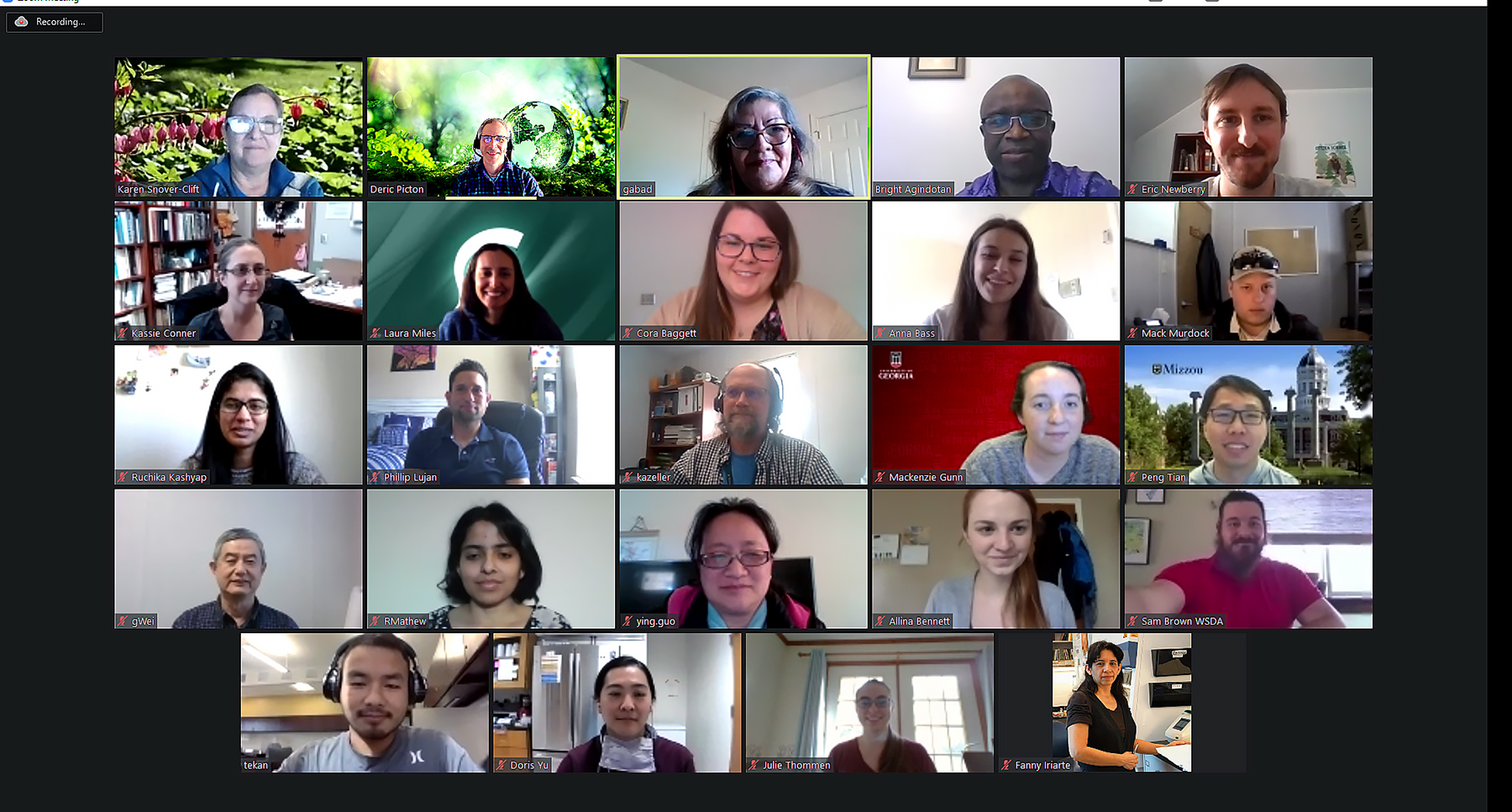
Co-Instructors: Jarred Yasuhara-Bell and Reny Mathew (USDA-APHIS-PPQ-S&T, Beltsville Laboratory)
Moderators: Deric Picton (USDA-APHIS-PPQ-S&T, Beltsville Laboratory) and Karen Snover-Clift (Cornell University)
Participants: Sam Brown (Washington State Department of Agriculture); Laura Miles (Michigan State University); Anna Bass, Allina Bennett, Mackenzie Gunn, and Tekan Rana (University of Georgia); Phillip Lujan (New Mexico State University); Elizabeth Marie Hellman (University of California at Davis); Julie Thommen (Pennsylvania Department of Agriculture); Ying Yi Guo and Doris Yu (California Department of Food & Agriculture); Peng Tian (University of Missouri); Jill Pollok (University of Delaware); Kassie Connor and Cora Yates (Auburn University); Mack Murdock (University of Idaho); Fanny Iriarte (University of Florida); Ruchika Kashyap (South Dakota State University).
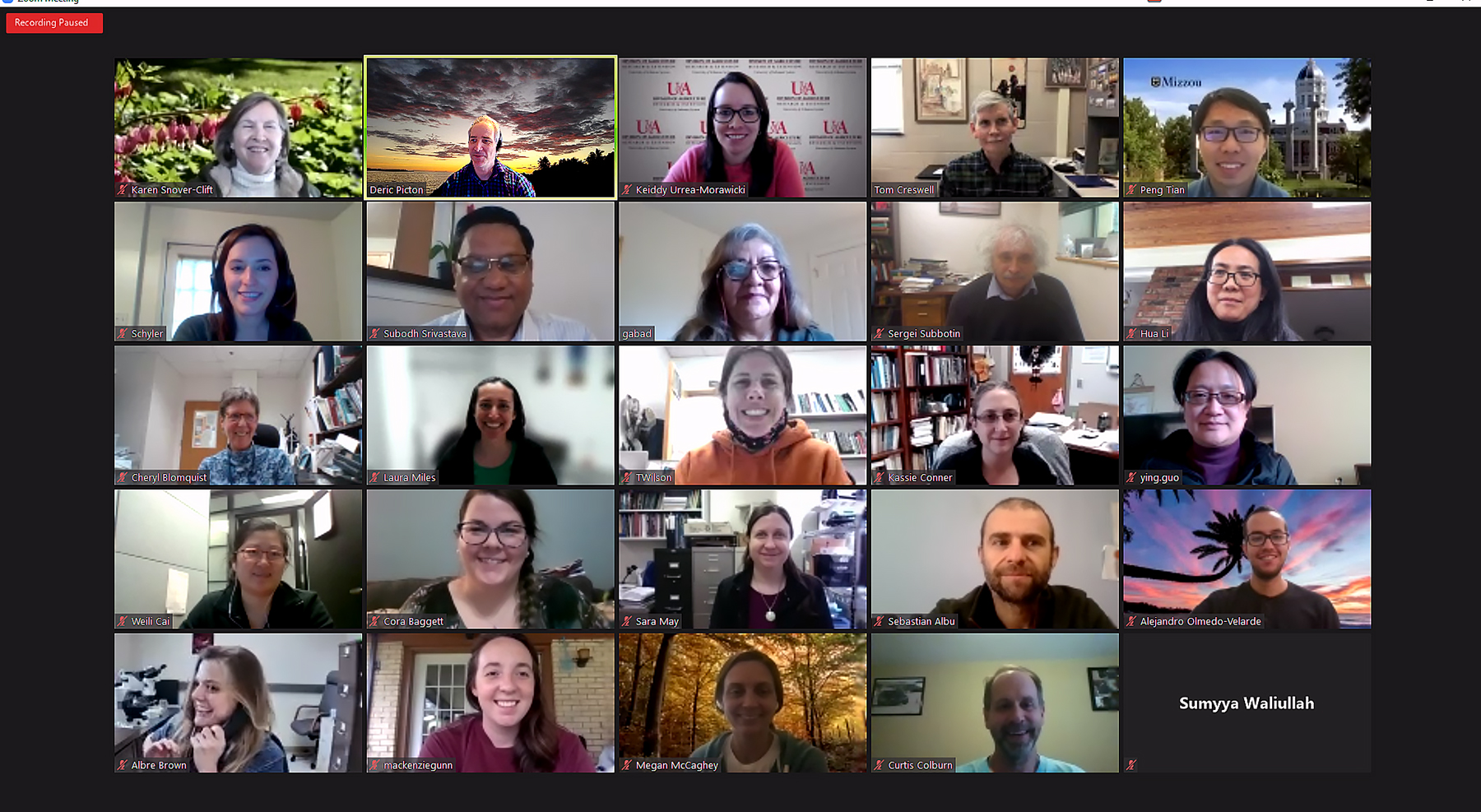
Moderators: Deric Picton (USDA-APHIS-PPQ-S&T, Beltsville Laboratory) and Karen Snover-Clift (Cornell University)
Participants: Telissa Wilson (Washington Department of Agriculture); Laura Miles (Michigan State University); Mackenzie Gunn, Tammy Stackhouse, Sumyya Waliullah and Emran Ali (University of Georgia); Tom Creswell (Purdue University); Sebastian Albu, Cheryl Blomquist, Ying Yi Guo and Sergei Subbotin (California Department of Food & Agriculture); Albre Brown and Megan McCaghey (University of California at Davis); Keiddy Urrea-Morawicki (University of Arkansas); Peng Tian (University of Missouri); Kassie Conner and Cora Yates (Auburn University); Alejandro Olmedo-Velarde (University of Hawaii); Hua Li (University of Kentucky); Curt Colburn (Clemson University); Sara May (Penn State University); Fanny Iriarte (University of Florida).
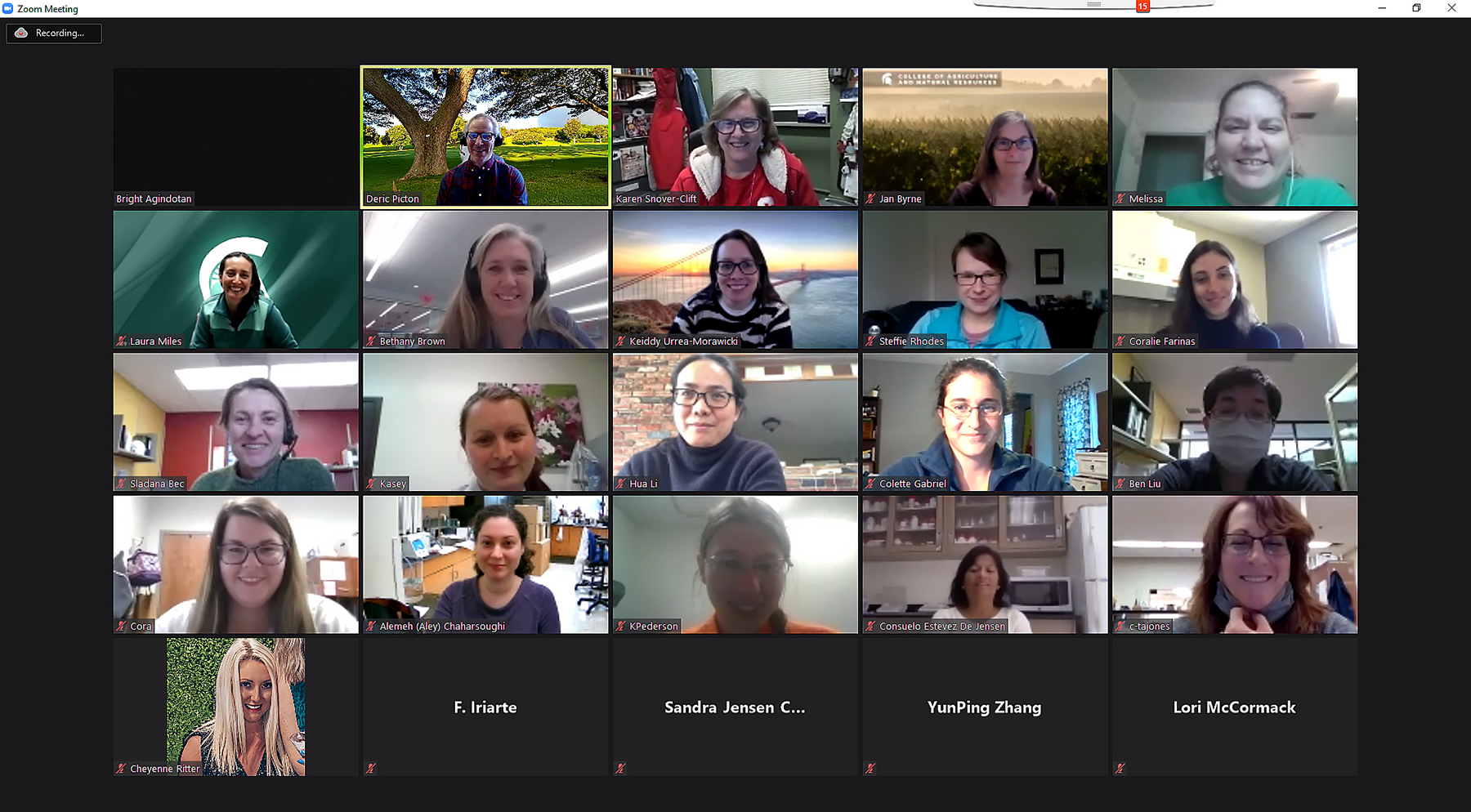
Moderators: Deric Picton (USDA-APHIS-PPQ-S&T, Beltsville Laboratory) and Karen Snover-Clift (Cornell University)
Participants: Jan Byrne and Laura Miles (Michigan State University); Consuelo Estevez De Jensen (University of Puerto Rico); Colette Gabriel (Ohio Department of Agriculture); Peng Tian (University of Missouri); Jill Pollok (University of Delaware); Holly Goodwin, Lori McCormack, Cheyenne Ritter and Cora Yates (Auburn University); Keiddy Urrea-Morawicki (University of Arkansas); Fanny Iriarte and Melissa Irizarry (University of Florida); Hua Li (University of Kentucky); Haley Scott (USDA-APHIS-PPQ Regional Laboratory); Sladana Bec, Bethany Brown, Coralie Farinas, Katie Pederson, Kasey Shazer (Ball Horticultural Company); Sandra Jensen (Cornell University); Stefanie Rhodes (Michigan Department of Agriculture); Alemeh Chaharsoughi and Yunping Zhang (California Department of Food & Agriculture); Tammy Jones (Pennsylvania Department of Agriculture).
Moderators: Deric Picton (USDA-APHIS-PPQ-S&T, Beltsville Laboratory) and Karen Snover-Clift (Cornell University)
Participants: Nathan Chambers and Sapp Dickerson (Washington State Department of Agriculture); Consuelo Estevez De Jensen (University of Puerto Rico); Alexi Dong, Mackenzie Gunn, Tammy Stackhouse and Sumyya Waliullah (University of Georgia); Chandler Day (Kansas State University); Bliss Betzen and Haley Scott (USDA-APHIS-PPQ Regional Laboratory); Rachel Knier (Pennsylvania Department of Agriculture); Jen Olson (Oklahoma State University); Keiddy Urrea-Morawicki (University of Arkansas); Alejandro Olmedo-Velarde (University of Hawaii); Hua Li (University of Kentucky); Fanny Iriarte (University of Florida); Laura Miles (Michigan State University); John Bonkowski (Purdue University).
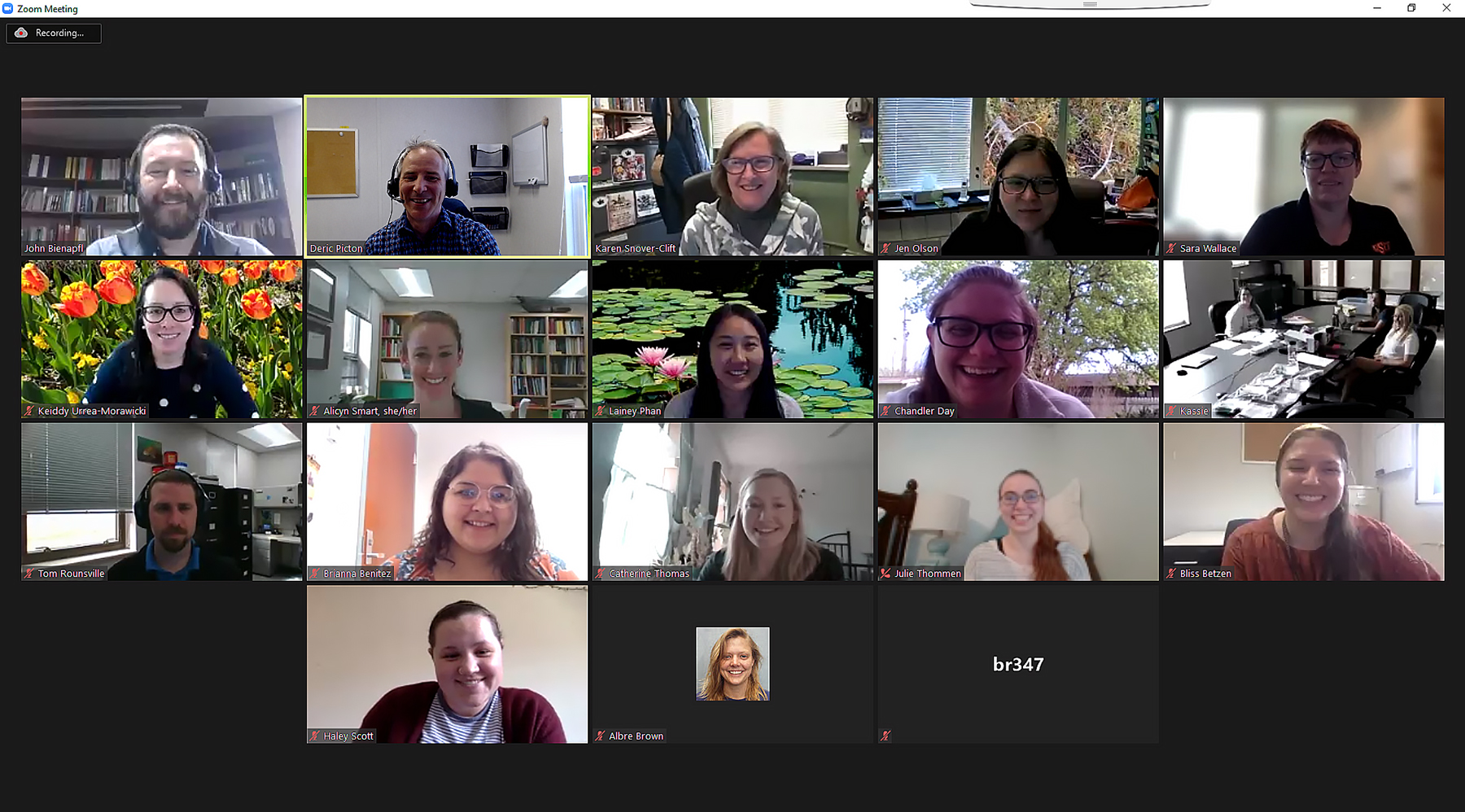
Moderators: Deric Picton (USDA-APHIS-PPQ-S&T, Beltsville Laboratory) and Karen Snover-Clift (Cornell University)
Participants: Bliss Betzen and Haley Scott (USDA-APHIS-PPQ Regional Laboratory), Tom Rounsville and Alicyn Smart (University of Maine); Tammy Stackhouse and Sumyya Waliullah (University of Georgia); Chandler Day (Kansas State University); Albre Brown and Lainey Phan (California Department of Food and Agriculture); Jen Olson and Sara Wallace (Oklahoma State University); Kate Thomas and Julie Thommen (Pennsylvania Department of Agriculture); Keiddy Urrea-Morawicki (University of Arkansas); Holly Goodwin and Cheyenne Ritter (Auburn University); Brianna Benitez (University of Florida).
Deric Picton and Yazmin Rivera, USDA-APHIS-PPQ-S&T Beltsville Laboratory
Pat Shiel, USDA-APHIS-PPQ-S&T
For 19 years, groups of NPDN members and partners have gathered annually in Maryland for one of our most valued training opportunities, the NPDN-Beltsville Advanced Diagnostic Workshops. Just like so many other aspects of our lives in 2020 and 2021, these workshops also needed to adapt due to the COVID-19 pandemic and associated restrictions. To offer these workshops in 2021, we needed an alternate plan.
You may remember in March of last year, half of the 2020 workshops were suddenly cancelled when the COVID-19 outbreak was declared a pandemic and states began implementing shut-down protocols. We had hoped to make up these sessions in the fall, but as domestic travel restrictions were extended, it became obvious that we needed to focus on how we would provide the 2021 workshops.
To tackle the task of providing workshop materials during a pandemic, a planning team was established in the fall of 2020. The team included Deric Picton and Yazmin Rivera of the USDA-APHIS-PPQ-S&T Beltsville Laboratory, Pat Shiel of USDA-APHIS-PPQ-S&T in Raleigh, and Karen Snover-Clift and Barb Riker of Cornell University.
The planning team members wrestled with how to modify the workshops to meet the pandemic guidelines: Should we offer smaller class sizes with increased distancing between participants? Or live virtual topic lectures? Or prerecorded procedure training videos? After many discussions, the team felt the best option was to convert the workshop materials to a virtual delivery format.
Priority number one was to deliver quality and valuable substitutes for the face-to-face training sessions. As many of you know, there are many benefits to standing in Building 580. When physically in Beltsville, the participants meet the scientists that developed and/or validated the procedures they are using, they tour the facilities, touch and use different pieces of equipment and learn what features are important, perform the hands-on activities in the presence of experts that can guide them as questions arise, focus on the training sessions with no distractions of other responsibilities, and get to spend time networking with their colleagues that perform similar duties and have similar responsibilities to their own.
As we developed the alternate plan, we focused on the advantages of providing an all-virtual workshop season. The primary benefit in 2021 was the increased class size. We were able to triple the allowable number of participants. On-site workshops are capped at eight participants because of travel expenses and the size of the training laboratory. By going virtual, we were able to invite up to 25 participants to each workshop. By not traveling, the participants did not sacrifice time away from their families and from their home-base work responsibilities. Also, recordings of the virtual workshops will be used in future LearnUpon training modules, the NPDN’s new, online, learning management system.
Five subjects were offered virtually in 2021 and delivered between March 9 and April 14. The subjects were selected based on ease of conversion to a virtual format and the annual survey of most requested topics. Two of the workshops included a practical, hands-on activity and materials that needed to be shipped to the participants for processing at their home-base laboratory. Making these substantial changes over a few months was a huge undertaking and took the efforts of many.
2021 Beltsville Workshop Schedule:
(Workshops are listed below with DATE offered, the TOPIC or title, and the LENGTH.)March 9, 2021: Seed Extraction Workshop; Lecture only, 2 hours.
March 10-12, 2021: Bioinformatics Workshop-Module SS; Lectures only, 3 days
March 15-17, 2021: Bioinformatics Workshop-Module HTS; Lectures only, 3 days
March 18, 2021: Seed Extraction Workshop; Lecture only, 2 hours.
March 22-30, 2021: Isothermal Amplification Workshop, Lectures March 22 & 30; Independent Lab March 23-26
April 5-13, 2021: Phytophthora 101 Workshop, Lectures April 5 & 13; Independent Lab April 6-9

Workshop instructors need to be commended for their ability to quickly modify their lectures into the virtual format without losing the quality of the content. Instructors organized all aspects of the first-time offering of the off-site, hands-on training component. They determined what was needed, prepared materials and instructions, scheduled timely shipments to each participant’s home base, and set aside time to answer questions that arose during the practical exercise. Tripling the number of participants increased the time needed to gather registrants, share plans for each workshop, set up Zoom sessions, deliver preworkshop details and materials, moderate each workshop session, record sessions, and post videos.
The instructors and planning team members want to thank the workshop participants for their patience this year! We learned several lessons during the 4- to 6-hour days on Zoom and through the entire process, and future workshops will benefit from this experience. Even though we feel these workshops were very successful, we all are hoping to travel to Beltsville in March 2022.
Congratulations to all NPDN networks members and partners! We provided valuable training content to 122 participants in six workshops over a six-week period. As you all know, this was done during a time when many professional development opportunities were cancelled due to the pandemic, which makes providing this content even more significant. Past attendees have expressed how beneficial these trainings are for their individual growth, and our leadership is very thankful our members have these network-wide professional development opportunities! We cannot thank the Beltsville Laboratory leadership and scientists enough for their ongoing commitment to delivering the NPDN members and our partners with quality, advanced diagnostic trainings.
2021 Beltsville Workshop Instructors and Participants
March 9, 2021 — Seed Extraction Workshop
Instructors: Bright Agindotan, (USDA-APHIS-PPQ-S&T, Beltsville Laboratory)Moderators: Deric Picton (USDA-APHIS-PPQ-S&T, Beltsville Laboratory) and Karen Snover-Clift (Cornell University)
Participants: Gaelle Hollandbeck (Kansas Department of Agriculture); Sapp Dickerson (Washington State Department of Agriculture); Allina Bennett, Mackenzie Gunn, Owen Hudson, Tekan Rana, Tammy Stackhouse, Sumyya Waliullah and Emran Ali (University of Georgia); Miranda Harrington (University of Idaho); Phillip Lujan (New Mexico State University); Joy Pierzynski (The Ohio State University); Karen Snover-Clift (Cornell University); Keiddy Urrea-Morawicki, (University of Arkansas); Peng Tian (University of Missouri); Kassie Conner (Auburn University); Michael Melzer, Alejandro Olmedo-Velarde and Alexander Kong (University of Hawaii); Austin Rueda (University of Texas); Ana Cristina Fulladolsa Palma (Colorado State University); Jake Ueckert (Texas A&M University).

March 10-12 — Bioinformatics Workshop-Module SS
Instructors: Gloria Abad, Yazmin Rivera, Eric Newberry, Stefano Costanzo, Kurt Zeller, Bright Agindotan (USDA-APHIS-PPQ-S&T, Beltsville Laboratory)Co-Instructors: Jarred Yasuhara-Bell and Reny Mathew (USDA-APHIS-PPQ-S&T, Beltsville Laboratory)
Moderators: Deric Picton (USDA-APHIS-PPQ-S&T, Beltsville Laboratory) and Karen Snover-Clift (Cornell University)
Participants: Sam Brown (Washington State Department of Agriculture); Laura Miles (Michigan State University); Anna Bass, Allina Bennett, Mackenzie Gunn, and Tekan Rana (University of Georgia); Phillip Lujan (New Mexico State University); Elizabeth Marie Hellman (University of California at Davis); Julie Thommen (Pennsylvania Department of Agriculture); Ying Yi Guo and Doris Yu (California Department of Food & Agriculture); Peng Tian (University of Missouri); Jill Pollok (University of Delaware); Kassie Connor and Cora Yates (Auburn University); Mack Murdock (University of Idaho); Fanny Iriarte (University of Florida); Ruchika Kashyap (South Dakota State University).

March 15–17 — Bioinformatics Workshop-Module HTS
Instructors: Schyler Nunziata, Subodh Srivastava and Gloria Abad (USDA-APHIS-PPQ-S&T, Beltsville Laboratory)Moderators: Deric Picton (USDA-APHIS-PPQ-S&T, Beltsville Laboratory) and Karen Snover-Clift (Cornell University)
Participants: Telissa Wilson (Washington Department of Agriculture); Laura Miles (Michigan State University); Mackenzie Gunn, Tammy Stackhouse, Sumyya Waliullah and Emran Ali (University of Georgia); Tom Creswell (Purdue University); Sebastian Albu, Cheryl Blomquist, Ying Yi Guo and Sergei Subbotin (California Department of Food & Agriculture); Albre Brown and Megan McCaghey (University of California at Davis); Keiddy Urrea-Morawicki (University of Arkansas); Peng Tian (University of Missouri); Kassie Conner and Cora Yates (Auburn University); Alejandro Olmedo-Velarde (University of Hawaii); Hua Li (University of Kentucky); Curt Colburn (Clemson University); Sara May (Penn State University); Fanny Iriarte (University of Florida).

March 18 — Seed Extraction Workshop
Instructors: Bright Agindotan, (USDA-APHIS-PPQ-S&T, Beltsville Laboratory)Moderators: Deric Picton (USDA-APHIS-PPQ-S&T, Beltsville Laboratory) and Karen Snover-Clift (Cornell University)
Participants: Jan Byrne and Laura Miles (Michigan State University); Consuelo Estevez De Jensen (University of Puerto Rico); Colette Gabriel (Ohio Department of Agriculture); Peng Tian (University of Missouri); Jill Pollok (University of Delaware); Holly Goodwin, Lori McCormack, Cheyenne Ritter and Cora Yates (Auburn University); Keiddy Urrea-Morawicki (University of Arkansas); Fanny Iriarte and Melissa Irizarry (University of Florida); Hua Li (University of Kentucky); Haley Scott (USDA-APHIS-PPQ Regional Laboratory); Sladana Bec, Bethany Brown, Coralie Farinas, Katie Pederson, Kasey Shazer (Ball Horticultural Company); Sandra Jensen (Cornell University); Stefanie Rhodes (Michigan Department of Agriculture); Alemeh Chaharsoughi and Yunping Zhang (California Department of Food & Agriculture); Tammy Jones (Pennsylvania Department of Agriculture).
March 22–30 — Isothermal Amplification Workshop
Instructors: Gem Santillana, Kurt Zeller and Jarred Yasuhara-Bell (USDA-APHIS-PPQ-S&T, Beltsville Laboratory)Moderators: Deric Picton (USDA-APHIS-PPQ-S&T, Beltsville Laboratory) and Karen Snover-Clift (Cornell University)
Participants: Nathan Chambers and Sapp Dickerson (Washington State Department of Agriculture); Consuelo Estevez De Jensen (University of Puerto Rico); Alexi Dong, Mackenzie Gunn, Tammy Stackhouse and Sumyya Waliullah (University of Georgia); Chandler Day (Kansas State University); Bliss Betzen and Haley Scott (USDA-APHIS-PPQ Regional Laboratory); Rachel Knier (Pennsylvania Department of Agriculture); Jen Olson (Oklahoma State University); Keiddy Urrea-Morawicki (University of Arkansas); Alejandro Olmedo-Velarde (University of Hawaii); Hua Li (University of Kentucky); Fanny Iriarte (University of Florida); Laura Miles (Michigan State University); John Bonkowski (Purdue University).

April 5–13 — Phytophthora 101 Workshop
Instructors: John Bienapfl, Gloria Abad and Reny Mathew (USDA-APHIS-PPQ-S&T, Beltsville Laboratory)Moderators: Deric Picton (USDA-APHIS-PPQ-S&T, Beltsville Laboratory) and Karen Snover-Clift (Cornell University)
Participants: Bliss Betzen and Haley Scott (USDA-APHIS-PPQ Regional Laboratory), Tom Rounsville and Alicyn Smart (University of Maine); Tammy Stackhouse and Sumyya Waliullah (University of Georgia); Chandler Day (Kansas State University); Albre Brown and Lainey Phan (California Department of Food and Agriculture); Jen Olson and Sara Wallace (Oklahoma State University); Kate Thomas and Julie Thommen (Pennsylvania Department of Agriculture); Keiddy Urrea-Morawicki (University of Arkansas); Holly Goodwin and Cheyenne Ritter (Auburn University); Brianna Benitez (University of Florida).
